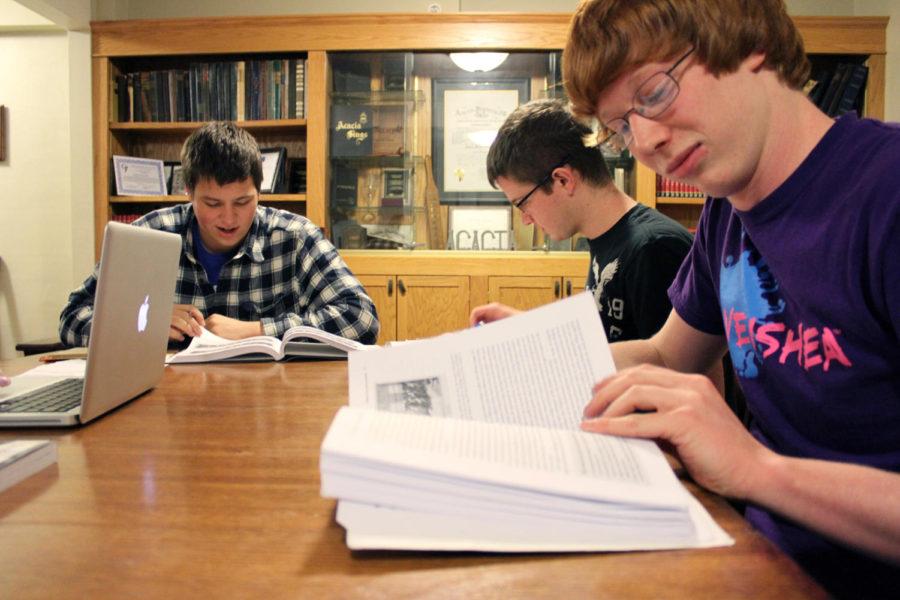Greek life encourages members with GPA expectations
Photo: Blake Lanser/Iowa State Daily
Acacia Fraternity brothers Tanner Jaeger, sophomore in chemical engineering, Ryan Lohse, sophomore in management information systems, and Addison Kistler, junior in mechanical engineering, study together in their house to try for better GPAs.
February 12, 2013
Greek life is a curious concept to those who are not themselves greek. The student body’s perception of the greek lifestyle varies drastically. However, the greek community at Iowa State has shown that being in a fraternity or sorority can be beneficial to an education through reports of academic excellence.
Iowa State fall 2012 grade reports for the Interfraternity Council, which includes all the fraternities on campus, shows the average GPA is 2.99, the same as the average non-greek GPA.
The Collegiate Panhellenic Council, which includes all sororities on campus, shows the average GPA is 3.11, five points higher than the average non-greek undergraduate GPA.
“Academics always come first,” said Callah Nelson, sophomore in architecture who is in charge of membership for Pi Beta Phi.
Acacia, Pi Beta Phi and many others are highly focused on the academic success of members.
Social events are essential in the greek community and to the organizations that benefit from the houses’ fundraisers and philanthropies. However, if a member’s grades are not up to the house’s standards, privileges are taken away.
Natalie Malliet, sophomore in elementary education and member of Gamma Phi Beta, said a woman is almost never kicked out of a house for academic reasons.
Many houses have reward systems for grades and not skipping classes.
“We have a ‘no-skip skippy jar’ that passes around during chapter; if you haven’t skipped class, you get a reward for that. We try to make it as fun as possible,” said Clare Goeken, senior in kinesiology and health and president of Gamma Phi Beta sorority.
Gamma Phi Beta was ranked number one last semester for having the highest GPA at 3.31.
Tessa Rife, president of Alpha Delta Pi sorority and sophomore in English, said when a member’s GPA goes below the standard, she would meet with the scholarship chair to set up a plan to make them successful in the upcoming semester.
“Penalties on grades going below the standard include restrictions on going to events, having to submit midterm grades, or having to submit weekly grade reports,” Rife said.
According to greek affairs webpage, fraternities and sororities at Iowa State strive for high scholarship and developing academic excellence among their chapter members.
Alpha Delta Pi’s standard for freshmen members is to have at least a 2.6 high school GPA and a national standard of 2.0 GPA to stay off academic probation.
For Pi Beta Phi, the standard GPA to be accepted into the house is a 2.75.
Tom McGee, senior in industrial engineering and president of Acacia Fraternity, said Acacia tries to get high academic people and once they are a part of the house, they try to match achievements. The comparison to one another makes an academic-striving atmosphere in the house.
A sorority or fraternity is more than a house full of college students; to Nelson, “It’s a home away from home.”
“One of our goals this semester is to have everyone involved in something on campus, and I’d say we are almost there,” McGee said.

















